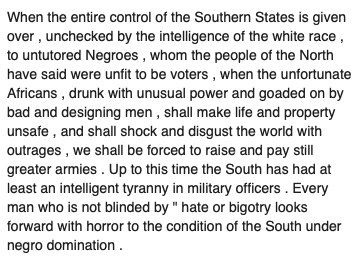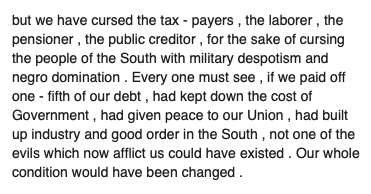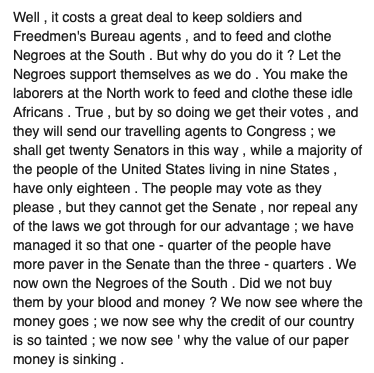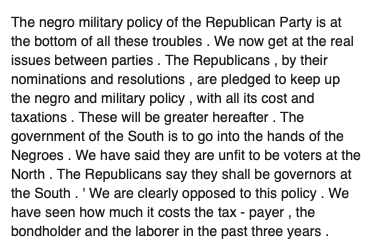
So there are LOTS of differences between the U.S. after the Civil War and right now, as Adam says (and my argument is not that this is a 1:1 comparison, but that we are potentially at a similar crossroads in terms of potential for progress)
https://twitter.com/arothmanhistory/status/1303513361926234112
But I actually want to respond by focusing on something that is maybe underappreciated about how little things had changed in the immediate aftermath, politically. In 1868, the Dems run Horatio Seymour on their classic themes of white supremacy and economic populism.
Most people focus on Francis Blair, his virulently racist running mate, but Seymour's convention speech is interesting to me because of its combining of certain...familiar themes. (Note he considers enfranchisement of black men racist...against white people!) 



In particular, Seymour hammers at the idea that taxpayer dollars are being used to "clothe the idle african," rooted in the impression that emancipated refused to work (when it was really now free, they did not want to work under slave-like conditions.) 



The Republicans meanwhile, are restricting their advocacy of black male suffrage for the South only (to the outrage of the Radicals) and Grant is running on "Let Us Have Peace." Now, Grant wins pretty solidly in the electoral college, 214-80.
But that actually obscures the narrowness of Grant's win. The popular vote margin is quite thin, about 3 million to 2.7 million.
So just a few years after the Civil War, a very large number of Americans are ready to hand back the presidency to a party that is largely responsible for nearly destroying the country. And given the margin, it's likely that the difference was made up by black votes.
So yes, the civil war was an earthshattering experience, causing a tremendous amount of suffering for millions. And yet an appeal to white supremacy was nonetheless effective enough to nearly win power to those largely responsible for it shortly after.
If that outcome occurs, our entire history is very different. But it's just to say that certain forces in American politics, like white supremacy, are historically good at resisting the most monumental events. One reason why we are where we are.
Anyway, if this is interesting to you I hope you'll take the time to read my piece. theatlantic.com/magazine/archi…
• • •
Missing some Tweet in this thread? You can try to
force a refresh



